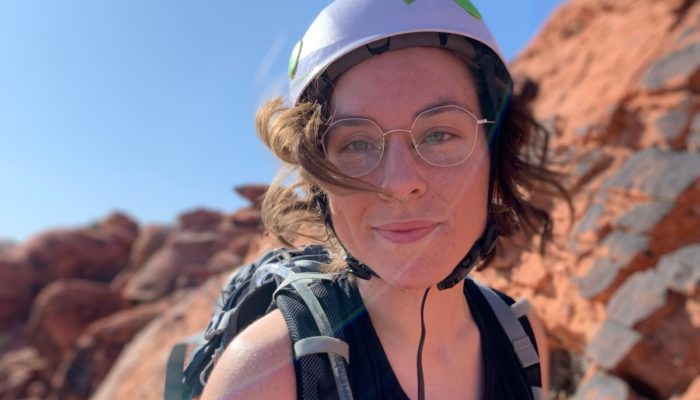
Autumn had finally arrived – the weather had cooled down enough to start rock climbing outside again in southern Arizona. I was working on scaling a mountain’s cliff face tall enough to be a skyscraper with nearly 15 fellow scientists climbing routes around me. My palms were sweaty with nerves and my muscles were starting to get tired. I questioned what possessed me to climb this huge rock. And I wasn’t alone! There were over a dozen scientists around me complaining about how gravity felt particularly heavy that day. When I finally reached the top and rappel down, it’s all worth it. It’s Type II fun – challenging, but fun in retrospect. After some reflection, I realized that, like endurance sports, sometimes doing science is also Type II fun.
This comparison didn’t quite set in until I started training for another endurance sport – ultrarunning. When I told non-scientist friends and family that I would be running a 5 km race, they would respond, “That’s great! Have fun!” Then, I caught the bug of running long distances. When I said I was training for a 60 km race, they’d ask in a mix of disbelief and mild revulsion, “Why? We’re proud, but that seems hard.” But, really, when I decided to go my Ph.D., the conversation was similar.
My non-scientist friends were right about rock climbing and ultrarunning – it’s hard. I’ve collided with the ground and the rock wall more times than I want to admit to anyone. While, I only needed to get stitches once, I have finished every run and climb more energized than when I started.
They were also right about working in science. At times, it has been hard – but incredibly rewarding. I spent 3 months trying to make a set of sensors that could send and receive compression waves in soil and withstand being spun at 80 m/s2 for an experiment. One day, I finally got them to work and was able to run my 8-hour experiment. The research team cheered and celebrated the success. Long hours of problem solving had finally paid off and, with the benefit of hindsight, I’d probably do it again.
While thinking about this writing this article, I realized that a significant fraction of my colleagues does endurance sports. I asked why they run, climb, swim, cycle…
One said that she jokes that we’re all masochistic, but that the harder the climbing route, the stronger the feeling of accomplishment. It keeps her going back. In her research, she’s developing a complex biochemical numerical model. This work requires a challenging and mundane debugging effort but knows that it is worth it when it all works.
Another enjoys the challenge and sees each individual physical move in sport as working towards a problem. He compared this to every step of conducting research – each requiring focus and control.
Another endurance athlete scientist appreciates their sport because it gives them the opportunity to focus inward. Their success is dependent on their own performance and revel in the control and reward when they succeed. This diverges from the best science – which requires collaboration and a team. Also, science is sometimes Type I fun – or, enjoyable while it’s happening. Some of the best collaborations start at coffee breaks or out for drinks after the official conference programming has ended.
Sure, my sample size is small (n = 10), but I’m not the first to make the comparison between science and endurance sports. Both take perseverance, focus, and tenacity, but it’s all worth it and (Type II) fun in the end.

Caitlyn Hall (she/her) is a Ph.D. student at Arizona State University. Her current research focus is promoting sustainability and natural hazard resilience using bacteria to reduce damage from earthquake-induced liquefaction. She works with industry, community, and government leaders to develop best-fit technical and policy solutions to best-address a community’s challenges and values. Her other research focuses include controlled environment agriculture, sustainable use of resources for urban farming, and using biochemical methods to remediate oil-contaminated soil. For fun, Caitlyn spends her time rock climbing and trail running.
Edited by Matthias Sprenger

Anne Alderman
A wonderful article! Thank you for your outstanding insight. I look forward to reading more from you.
Pingback: GeoLog | Looking back at the EGU blogs in 2019: a competition - GeoLog
Marjanne Zander
Interesting blog!
Thanks for sharing your thoughts on this.